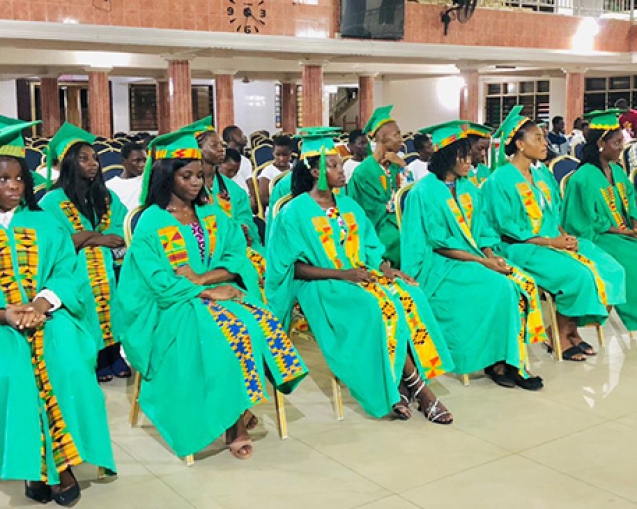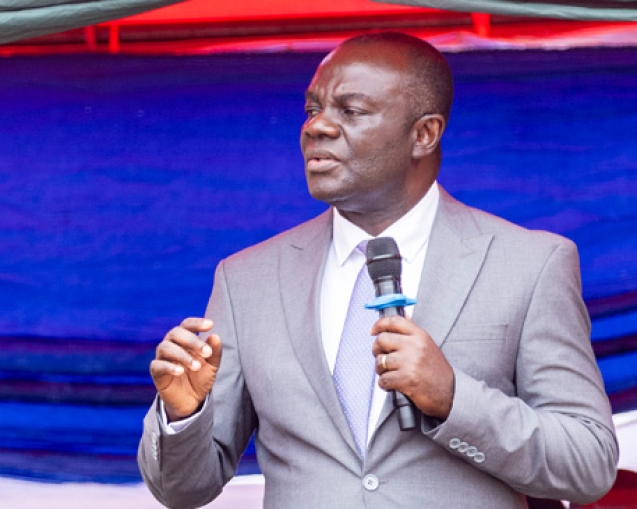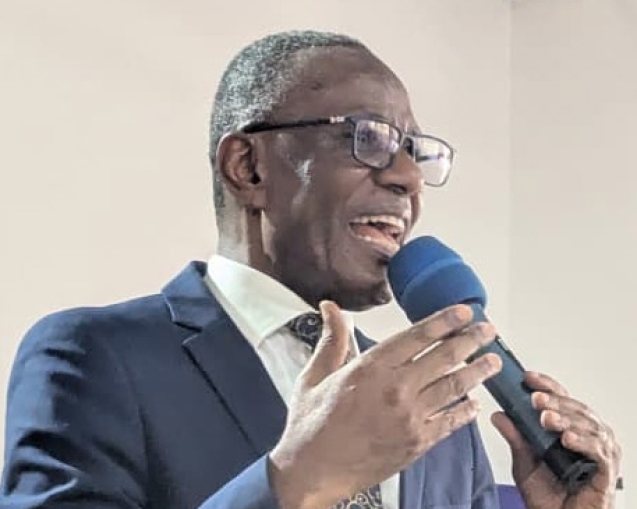The Church of Pentecost is undoubtedly a household name in Ghana. There is no dispute about this in academia (Asamoah-Gyadu, 2019; Amanze, 2019; Ogbuji, 2020; Gyau, 2021;) or the arcade of social life. With the church’s phenomenal growth and impactful influence in every sector of Ghana, it goes without mentioning that Christianity in this country cannot be studied or discussed without recourse to The Church of Pentecost.
As I analyse it, the church’s growth is threefold; numerical growth, visible infrastructural growth, and social responsibility growth. With the current population of 3.5 million (46th GCM Brochure, p. 19), it is undeniable that every household in Ghana from Abor to Zaare has a member of The Church of Pentecost. Again, the edifices of the church, by God’s infinite grace, tower magnificently from the hamlets to the cities.
The church’s ever-present yellow, white and blue colours are seen at every junction and joint as one tours the nation. You cannot miss that The Church of Pentecost is truly ‘everywhere you go’. Furthermore, it is arguably the religious organisation taking social responsibility to another level. To buttress this, let me mention the prisons project, police stations project, irrigation project and the evacuation of Ghanaian citizens from Ukraine as a few of the many imposing show of commitment to affect human lives holistically – spiritually (spirit), psychologically (soul) and physically (body).
It would be odd if any Ghanaian reading this piece heard of The Church of Pentecost for the first time. However, this massive awareness of the church has not translated into knowledge of the church. This may sound a bit controversial, but I will attempt to defend this statement, suggest reasons and proffer solutions to this unfortunate situation that negates the excellent work the church is doing and creates an antagonistic reception of its important place in our social media discourses.
According to Bekk and Ozturkcan (2018), brand awareness is ‘the degree to which a brand is recognised by potential customers and is associated with a particular product category or need’. Per this definition, I can conclude that The Church of Pentecost has huge brand awareness. Everyone knows it is a church, and for those who care to distinguish further, they know it is a Pentecostal church. Scholars posit that brand awareness can be measured by various indicators, such as brand recall (the ability to remember a brand top-of-mind) and brand recognition (the ability to identify a brand from others of similar nature) (Sharma, 2019; Natarelli & Plapler, 2020). Clearly, The Church of Pentecost enjoys this in good measure. Ask anyone to mention a Pentecostal church in Ghana, and the name The Church of Pentecost will come up.
Unfortunately, this is where it mostly ends up. Nothing or little is known of the brand in terms of its values, beliefs, operational focus, mission and vision. The result of this lack of critical mass of knowledge is the demonstration of this crux ignorance by the masses who elect for themselves to respond or react to news about the church. I have had the privilege of studying in three of Ghana’s renowned institutions of Communication Studies, even to the graduate level, and I have always felt embarrassingly intrigued by the knowledge people possess of The Church of Pentecost.
Much of the so-called knowledge of the church exhibited in casual conversations and during class discourse are either myths, ancient practices, or hearsay of mere mudslinging. For example, on three occasions in two graduate schools, professors said that The Church of Pentecost risked collapse once the older generation, who, according to him, form the majority of the church’s membership, dies because it has refused to reform. Another had boldly remarked that the youth were leaving the church in droops.
Not only were the above assertions untrue, but they also revealed how ignorant people could be when they believe something to be accurate and do not bother searching and researching. This situation is not unusual but unacceptable, especially when they are stated as facts, defended blindly or made publicly. Some researchers adduce that when people become aware of a brand but fail to seek further information on the brand, they form misconceptions and wrong interpretations of the brand (Walker Jr. & John W. Mullins, 2020).
The solution is to seek knowledge rather than from the wrong sources. The Church of Pentecost is a church that has a defence for whatever she has believed, practised and lives for (2 Peter 3:15). Thus, she has authored so much on herself and opened her doors for researchers to the extent that there is no darkness but light for those who seek to know.
The Church of Pentecost recently held a very successful 46th Session of its General Council Meetings (the General Council Meeting is the church’s highest decision-making body). It was spirit-filled, the atmosphere of divine camaraderie, mutual concern and decisions making moments of radiating love. Even critics of the church will give her that unless their criticisms bother on enmity and envy.
During the grand opening session with over 5000 people in attendance, the Chairman of the church (the worldwide leader of the church), Apostle Eric Kwabena Nyamekye, gave an impressive state-of-church address which touched on every aspect of church life to the apt admiration of all including the guest of which was the Vice President of the Republic, Alhaji Dr Mahamadu Bawumia. So impressive was the delivery that all fraternal greetings touched on the great work the church has done. The Vice President of Ghana drew inspiration from that to admonish politicians to refrain from politics of lies and deception and major on data. The state-of-church address was so evidence-based that Dr Bawumia described it as ‘shedding so much light’.
Topical in the delivery by Apostle Nyamekye, Chairman of The Church of Pentecost, was the amount spent by the church on scholarships for church members. He stated that an amount of Gh₵10,686.084.76 was sent in 2022 by Districts, Areas and ministries in Ghana together with the headquarters to sponsor educational pursuits by members. This excludes what individual ministers and church leaders at various levels did to assist members with their educational needs. Commendable as this is, critics of the church ran to ‘market’ with accusations of these scholarships going to ministers, their children or families.
I shuddered in disbelief when I saw various social media platforms smeared by such blatant falsehood. Apostle Nyamekye chose his words carefully, and only the uninitiated, mischievous or finger-happy (borrowed from trigger-happy) will rush to social media to make such a post. Before announcing this scholarship package that went to church members, the Chairman had informed the ardent reader or listener of the package that went specifically to ministers sponsored for further education or scholarship given to children of deceased ministers (46th GCM Brochure, p. 42).
This is so mind-boggling in this era of information. A simple rule is that before you write on a subject, you research (RESEARCH) because knowledge evolves, things change, and what appears at face value may have a deeper meaning. Whiles this piece is about the unfortunate trend of people taking The Church of Pentecost to the laundry when she is just coming out of the bathroom, it is a concern all social media users must address ourselves too. We have become too finger-happy as a people lately. We forward just anything and have become hugely guilty of spreading the misinformation of those who author such ‘viruses’.
On scholarship for educational pursuit for members, The Church of Pentecost has as a rule that ministers and their families do not qualify. There is a different category of support for such. Scholarship committees exist at various levels of the church that vet brilliant but needy and promising but needy people and make selections based on the availability of funds and quota system. This is so transparent that candidates who attend the vetting processes get to know themselves, and whoever is selected is announced at the Local, District and Area levels. Nothing is in the shadows. In fact, the names of those awarded scholarships, including where they schooled or are schooling, can be obtained on request anytime or day. Every report sent on miracles; financial commitments are purely data-based and verifiable.
Inasmuch as this harm of blind criticism, misinformation and disinformation is mainly the doing of outsiders who are not members of The Church of Pentecost, a handful come from disgruntled members who do this for only God knows why. This is a sad commentary because everyone associated with a brand is expected to be a brand ambassador. How can a church member be out there painting their ‘home’ with mud?
From my little experience studying branding, we have various brand ambassadors. There are reluctant brand ambassadors (unwilling but compelled by the situation), poor image brand ambassadors (people who have been discredited by their ills), disloyal brand ambassadors (people who represent a brand but use a competing brand), fun brand ambassadors (people who represent a brand for fun), and committed brand ambassadors (people who are die-hard and ready to promote the brand). All these types of ambassadors could be hired or do so pro bono. In a church, the pulpit and pew are automatic ambassadors, first of Christ and the church denomination. It is, therefore, awkward, a betrayal of trust and disloyalty to be anything more than a fun brand ambassador or committed brand ambassador.
We are called to be an army prepared to stand up for Christ and defend our faith. As the General Secretary of The Church of Pentecost has reiterated severally, in The Church of Pentecost, if you do not know something or understand anything, you ask. I implore all members to seek to be well-educated on anything they do not understand and pursue that knowledge from suitable sources. Growing up in the church, we had this inquisitive and inquiring mindset, and the fathers were always there to help. I asked why we sit in church the way we do, why new coverts have to raise their hands when they say the sinner’s prayers, and why mothers must present their babies to the child’s father, who then gives the child to the officiating minister when the child is about to be christened. I have cited these examples because they look trivial, and very few ask about them, but I did and got educated on the church’s culture, traditions, practices, core values, etc. On the other hand, I had and continue to have fathers and mothers who will lend an ear anytime and explain all I need to know even today.
My humble suggestion, as I conclude, is that members should be both fun and committed ambassadors of The Church of Pentecost brand. It calls for getting all that we need to be aware and know of the brand and commit to educating others and doing it out of fun and pro bono. Do not wait until you are asked before speaking out for our Christ and church. In doing so, let us do so with seasoned language. Again, let those in leadership positions at various levels flex up a bit more and respond to all the questions, including the sarcastic ones, because denying them may push them to a smear campaign out of anger or to spite leadership.
For netizens and social media users, let us get our facts right. We are presented with a huge opportunity to interact, and we all need to ensure the platform is trustworthy, sanitised and worth investing our data in uploading or downloading content. Let me end by inviting you to accept the Lord Jesus Christ. He is the Truth! And The Church of Pentecost is an able representative of this Truth. He saves, gives illumination and provides eternal life. May I invite you to fellowship with a local Assembly of The Church of Pentecost near you and experience Jesus and what we believe and practice for ourselves? Come with an open mind and a clear conscience; you will never regret it. I was once a sceptic, but today I have found peace with the Lord Jesus and a haven to fellowship with the saints in The Church of Pentecost. God bless you.
Written by Pastor George Osei-Asiedu
REFERENCES:
Agyei, T. B. (2019). Assessing the role of lay leadership in the Church of Pentecost, Parkoso local. Doctoral dissertation, Department of Theology, Faculty of Humanities, Christian Service University College, Ghana
Ansari, S., Ansari, G., Ghori, M. U., & Kazi, A. G. (2019). ‘Impact of Brand Awareness and Social Media Content Marketing on Consumer Purchase Decision’. Journal of Public Value and Administrative Insight, 2(2), pp. 5–10. https://doi.org/10.31580/jpvai.v2i2.896
Asamoah-Gyadu, J. Kwabena, Lindhardt, M., Adogame, A. ‘Sighs and Signs of the Spirit: Ghanaian Perspectives on Pentecostalism and Renewal in Africa’. 1517 Media. JSTOR, https://doi.org/10.2307/j.ctv1ddcnfx. Accessed 05 May 2023.
Bergkvist, L. Taylor, C. R. (2022). ‘Reviving and Improving Brand Awareness as a Construct in Advertising Research’. Journal of Advertising 51 (3): pp. 294–307. doi:10.1080/00913367.2022.2039886
Chun, T. Y., Lee, D. K., & Park, N. H. (2020). ‘The effect of marketing activities on brand recognition, brand familiarity, and purchase intention on the SNS of franchise companies’. Journal of Asian Finance, Economics, and Business, 7(11), 955-966. https://doi.org/10.13106/jafeb.2020.vol7.no11.955
Saydan, R.; Dülek, B. ‘The impact of social media advertisement awareness on brand awareness, brand image, brand attitude and brand loyalty: A research on university students’. Int. J. Contemp. Econ. Adm. Sci. 2019, 9, 470–494
Nyanni, C.O. (2020). ‘Changing lanes: Second-generation African Pentecostals in the United Kingdom’. Journal of the European Pentecostal Theological Association, 40(1), pp. 32-45
The Church of Pentecost. (2023). The Church of Pentecost – 46th Session of The General Council Meetings Brochure. Pentecost Press, 14-72.
White, Peter. 2019. ‘Missional branding: A case study of the Church of Pentecost’. Theologies Studies. Theological Studies 4: pp. 1–7.


















